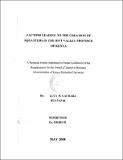| dc.description.abstract | The study sought to investigate the factors leading to the development and growth of Squatter problem in Kenya with special emphasis on Rift Valley Province. One hundred and ninety six (196) squatters were interviewed on what they thought contributed to the creation of the squatter problem in Kenya. The study made use of primary data collected using questionnaire method and secondary data from earlier researches, journals and books. Collected data was analyzed using descriptive statistics. Private land tenure was found to be the primary cause of Landlessness. This begets secondary causes like wife inheritance, maternal parenting, and displacement through tribal clashes, due legal processes and willful sale without consultation by spouse. Bad land laws which emanate from the establishment of private land tenure were found to be the main cause of landlessness .The research also established that the squatter is affected in many ways .The effects include poor health, lack of social amenities, inadequate food, limited access to education, social insecurity including violence against women and lack of financial securities. These issues are in line with the country's 2030 Vision and the Millennium Development Goals (MDGs). The study concluded that landlessness was caused by bad land laws and had a great negative impact on human resource and capital. The recommendations from the study are, that the laws and policy on land should be reviewed, that programs should be put in place to assist in alleviating the squatter problem. Further research should be carried out to separate the genuine squatters from the self-imposed squatters. The possible effects of Landlessness on the general human capital could also be investigated further. | en_US |

